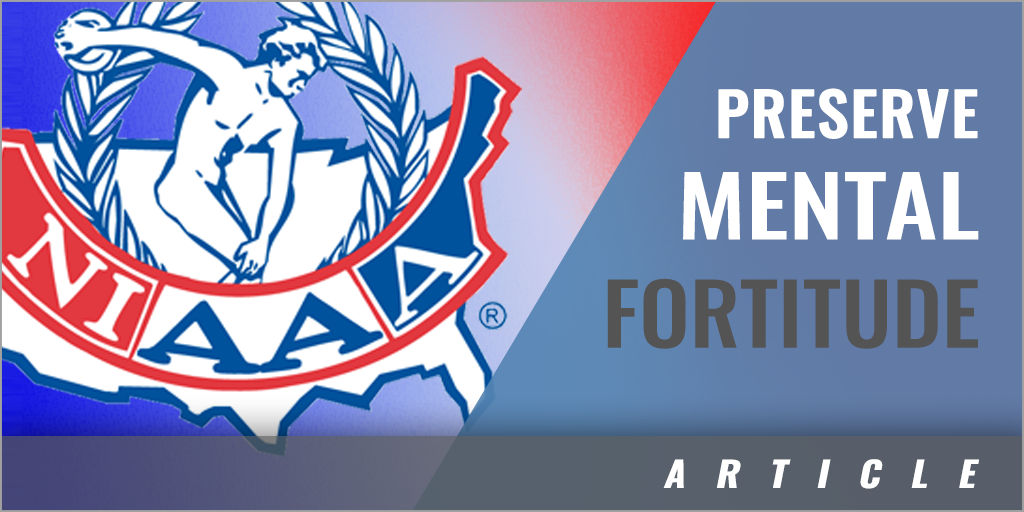|
By: Thomas Shanahan, CMAA - Athletic Administrator at Bishop Kelly High School, Idaho In the high-stakes world of athletic administration, the demands are ceaseless, the expectations high, and the pressure relentless. As stewards of athletic programs, we navigate the complexities of setting standards, solving problems, and making critical decisions. However, amidst the whirlwind of responsibilities, it's easy to overlook a crucial aspect of our well-being: mental health. Athletic administrators often find themselves at the intersection of various stakeholders – coaches, athletes, parents, teachers, administrators, and school board members. Each holds their own perspectives and demands. Balancing these expectations can be daunting, leading to a gradual erosion of our mental resilience. It's imperative to recognize this phenomenon and proactively develop strategies to safeguard our mental well-being. Incorporating the Big Three Just as athletes must prioritize proper nutrition, sleep, and exercise to perform optimally, athletic directors must also make self-care a priority. One cornerstone of mental health preservation is incorporating the "big three" elements into daily life-nutritious food, adequate sleep, and regular exercise. These are crucial for maintaining physical and mental health. While it may require some creativity to carve out time for these activities amidst a busy schedule, they are non-negotiables for managing stress and operating at peak performance. Personally, I carve out time in the early morning to ensure mental preparedness and avoid scheduling meetings that encroach upon this time. Sacred Sundays Establishing boundaries is essential for protecting mental health and maintaining work-life balance. Designating Sunday as a sacred family day, free from work-related interruptions, can provide much-needed respite and rejuvenation. While our roles may demand long hours and high stress, it's crucial to delineate boundaries and dedicate quality time to our loved ones. It's important also to communicate these boundaries clearly to coaches, colleagues, and stakeholders and enforce them rigorously. By prioritizing time for rest and relaxation, athletic directors can recharge and approach their work with renewed energy and focus. Importance of a Highly Supportive Administrative Team Surrounding the athletic administrator with a highly supportive administrative team is paramount, especially when it comes to game coverage and difficult parent conversations. An effective administrative team can provide invaluable assistance in organizing and coordinating game logistics, ensuring smooth operations before, during, and after events. From scheduling officials and managing facilities to handling ticketing and crowd control, a supportive admin team alleviates the burden on the athletic director. This allows them to focus on strategic planning and leadership. Moreover, a cohesive admin team fosters a culture of collaboration and shared responsibility, enhancing efficiency and promoting a positive working environment. Ultimately, the collective efforts of a dedicated admin team contribute significantly to the success and professionalism of the athletic program. Identify a Mentor Athletic Administrator(s) Having a mentor athletic administrator who is seasoned in the profession and has weathered the daily grind for years is invaluable for both personal and professional growth. This mentorship provides a guiding light through the complexities and challenges that come with the role of an athletic administrator. With their wealth of experience, they offer valuable insights, wisdom, and advice on navigating difficult situations, making tough decisions, and managing the various demands of the job. Additionally, a mentor serves as a sounding board, offering perspective and support during times of uncertainty or adversity. Their mentorship not only helps the athletic administrator develop essential leadership skills but also fosters resilience and confidence in tackling the rigors of the profession. Overall, having a mentor who understands the nuances of the role can be instrumental in shaping a successful and fulfilling career in athletic administration. Smile, Laugh, and Reflect on Purpose In the relentless pursuit of excellence, we must not overlook the power of simplicity and humor. Whether it's a leisurely walk to inspect facilities, a day out with a coach, or sharing a laugh with colleagues, these moments of levity replenish our reserves and remind us to embrace joy during the daily grind. Amidst the hustle and bustle of daily tasks and responsibilities, it's easy to lose sight of why you entered the profession in the first place. Periodically reflecting on the value that education-based athletics provides and the positive impact you have on young people and coaches can reignite your passion and sense of purpose. Remembering the difference you make can serve as a powerful motivator during challenging times and help maintain perspective. In conclusion, protecting your mental health as an athletic director is not just a luxury-it's a necessity. By prioritizing self-care, establishing boundaries, surrounding yourself with a highly supportive administrative team, leaning on mentors, and reflecting on purpose, you can safeguard your well-being and enhance your effectiveness as a leader. Remember, taking care of yourself isn't selfish-it's essential for achieving long-term success and making a positive impact in the lives of others. Tom Shanahan, Activities Director at Bishop Kelly High School, in Boise, Idaho. |







